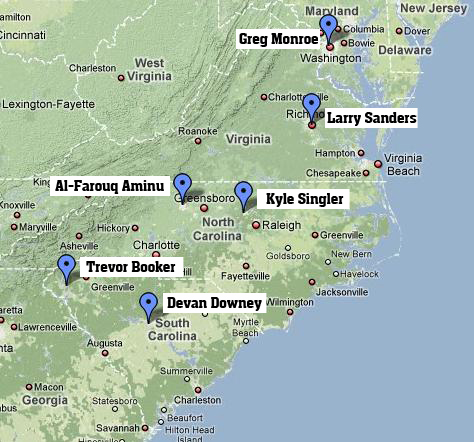RTC 2009-10 Impact Players – South Atlantic Region
Posted by rtmsf on September 21st, 2009Ed. Note: the previous posts in this series (Northeast and Mid-Atlantic) are located here.
Here we are with the third installment of our RTC 2009-10 Impact Players series, the ridiculously loaded South Atlantic region. Each week we’ll pick a geographic area of the country and break down the five players who we feel will have the most impact on their teams (and by the transitive property, college basketball) this season. Our criteria is once again subjective – there are so many good players in every region of the country that it’s difficult to narrow them down to only five in each – but we feel at the end of this exercise that we’ll have discussed nearly every player of major impact in the nation. Just to be fair and to make this not too high-major-centric, we’re also going to pick a mid-major impact player in each region as our sixth man. We welcome you guys, our faithful and very knowledgeable readers, to critique us in the comments where we left players off. The only request is that you provide an argument – why will your choice be more influential this season than those we chose?
South Atlantic Region (DC, VA, NC, SC, GA)
-
Al-Farouq Aminu, Soph, F – Wake Forest. After a recruiting class compiled by the late Skip Prosser that included first-round selections Jeff Teague and James Johnson, third year coach Dino Gaudio managed to lure five-star talent Al-Farouq Aminu to campus the next season. By all accounts, Aminu had a tremendous freshman season when looking at the big picture. He averaged nearly 13 points per contest, grabbed over eight rebounds a game and shot over 50% from the floor. He starred in Wake wins against BC (26/7), Clemson (21/10) and Duke (15/10). Aminu led all ACC rookies in rebounding, including 11 games as the Deacons team leader while scoring in double-figures 22 times. Due to his superior talent, Wake fans will still maintain they expect Aminu to take it to another level in 2009-10. Too often the 6’9 forward disappeared, though, scoring four points in 28 minutes in a 27-point loss to Miami or nine points in a close loss to bottom-feeder NC State or an 8 point, 2/12 FG performance in the ACC Tournament defeat at the hands of rival Maryland. These peaks and valleys are typical of even the most talented freshmen (besides maybe Kevin Durant), so Aminu shouldn’t be held accountable for Wake’s slide from the #1 team in the land to March goat. But with Teague and Johnson departed, it’s now Aminu’s team in Winston-Salem. With first-round talent and ability, the sky’s the limit for AFA in his second season leading a young Wake Forest squad back to the Dance to avenge last season.
-
Trevor Booker – Sr, F – Clemson. Trevor Booker is the best player that most people still have never heard of. Consider this: there are three returning players in America who were more efficient than Booker last season and you would have no problem picking all three out of a photographic lineup: Luke Harangody, Patrick Patterson and Cole Aldrich. But do you even know what Booker looks like? You will this year, as the beefy, athletic 6’7 forward can do it all and should vault into ACC POY territory with another year under his belt. Let’s take a closer look. As a second-team all-ACC selection and the top vote-getter on the all-defensive team last season, he trailed only Ty Lawson among high-usage (>20mpg) league players in eFG% (58%), led the conference in FG% and rebounding (first ACC player to do so since Tim Duncan) and averaged a double-double (15/10) in last year’s tough ACC. But most importantly to Clemson fans, Booker is only 20 wins away from becoming the winningest player in the history of the Tiger program. In his three seasons at Clemson, his teams have averaged 24 wins against 10 losses, and the 26 ACC Ws and two NCAA Tournament appearances the Tigers have achieved in large part through his ferocious dunks and tenacious defense represent the best three-year period in the program’s history. Booker had a slight scare last month with a low-grade stress fracture in his foot, but he’s expected to be completely healthy for the beginning of practice in October. It’s a good thing, because when Booker hangs up his kicks for the last time as a Clemson Tiger next March, he may very well be in the argument as the most accomplished player in the history of Clemson basketball.











































